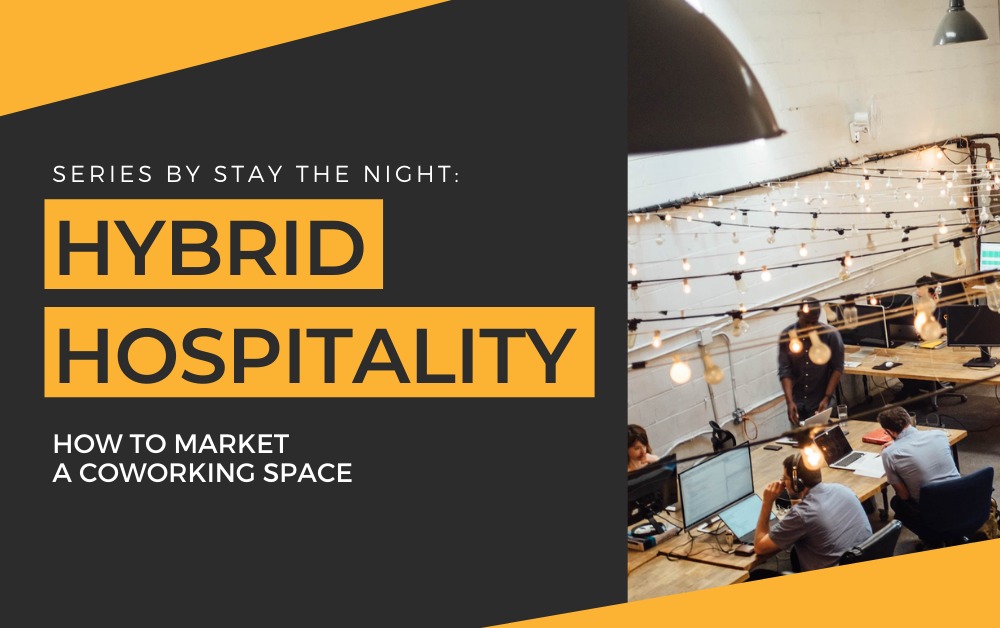COVID-19 has forced hospitality brands to adapt and diversify in order to survive. Hotels and hostels have expanded their offering to include coworking spaces; restaurants and bars have turned into takeaways and shops overnight; and brands have taken their experiences online with virtual events. And many of these hybrid models are here to stay.
Our latest series – Hybrid Hospitality – gives you all the advice and strategies you need to effectively adapt your marketing to this new type of hospitality.
In this post, we’ll be sharing our expertise on how to market a coworking space. Coworking is a concept that was already growing rapidly prior to 2020 with a yearly growth rate of 21.3% . The sector’s growth has been accelerated further in recent months with more companies embracing flexible working as a result of COVID-19
A number of our clients have coworking spaces onsite and, as a fully location-independent business, we use coworking spaces ourselves here in London (so we know exactly what your target audience is looking for). The challenge of marketing a coworking space is to balance attracting new members with retaining your current ones.
These tips will help you get started…
KNOW YOUR AUDIENCE
Before you jump in and start marketing, it’s important to have a clear picture of who you are talking to so that you are able to strategise accordingly. It’s likely that your co-working space has multiple target audiences, from established 9-5 businesses to weekend side hustlers. We suggest developing a customer persona for each segment. These customer personas form the foundation of your strategy and will help you to determine your marketing messaging and methods.
We cover this in more detail (and provide some free persona templates) in the first blog post of this series which you can find here.
FIND YOUR USPs
Your audience will be choosing from any number of spaces to work in, so what makes yours unique? This isn’t just what makes your space unique when it compares to traditional workspaces, but to your rival coworking spaces. While it’s likely that you’re already ticking the necessary boxes, you need to look beyond good coffee and fast WiFi here.
Some questions you and your team can discuss to identify your USPs are…
- What are we doing better than our competitors?
- What do we have that no one else is offering?
- Why do our current members choose us?
Once you have identified your USPs, make sure they are front and centre in your marketing messaging and across your website – you could even add a specific ‘Why choose us’ page or section to highlight this.
OPTIMISE YOUR WEBSITE
Assuming you already have your website up and running, you are going to want to make sure it’s search engine optimised so potential members can easily find you. Start with keyword research – list down search terms people may be using and then use a tool like Google Keyword Planner to drill this down further.
You’re going to want to ensure your website copy and elements such as meta descriptions, page titles and URLs include relevant keywords. Don’t forget to add alt text to your images, too. Ensure you have built your site map, check the site is mobile friendly and check loading speeds.
Continue monitoring your site’s performance and remember – SEO is a long-term process so keep checking up on your ranking and refresh your copy where necessary.
Side note: if you don’t have your website up and running yet or need support with your SEO, feel free to get in touch and our team will be happy to chat through the services we offer.
GET YOUR LISTINGS IN ORDER
Next step? Head to Google My Business and make sure everything is up to date. Add in contact information, photos of your space and highlight any amenities. Repeat this step on Facebook, Bing, Yahoo!, Yelp, etc.
Then you want to make sure you are listed on any relevant directories that your target audience might be using to search for their next workspace. Start with Coworker – which is a global directory boasting over 200,000 users a month – and then look closer to home for any listing sites that are specific to your location. Here in London, for example, you can find Coworking London.
CULTIVATE A COMMUNITY
From our research – and our team’s personal experience using coworking spaces – the number one motivation for people joining a coworking space is to connect with others. While it sounds like the dream to 9 – 5ers, working from home can get a little lonely (as more people have learned this year). Your members haven’t just signed up to pay for a chair and a desk – they have signed up for an experience. That’s why it’s so important to foster a sense of community at your coworking space and to promote this in your marketing.
There are a number of ways to do this – set up a group on Facebook or Slack to start discussions among members, hold onsite exercise classes, organise monthly business brunches or weekly wine hours. Anything to bring members together and make it easy for them to connect. And be sure to communicate this community ethos through your marketing – share photos and videos of member events on your social channels to show the culture you have created. FOMO is a real thing and it’s likely when your audience see your community, they will want to be a part of it.
FACILITATE PURPOSEFUL NETWORKING
As well as connecting with other members from a personal perspective, many people join a coworking space for the opportunity to network, collaborate and discover new business opportunities. From sharing new ideas over lunch to linking up on joint projects, you should make it easy for your members to work together. You could hold a speed networking night or create a database that allows members to easily search for others by their skillsets. If you or your team find out about members working together, be sure to ask if you can share about it on your social channels or as part of your content marketing – these are the stories your audience want to hear, and chances are your members will be happy with the extra exposure for their own businesses.
HARNESS THE POWER OF GOOGLE ADS…
Paid advertising is one of the most powerful ways to generate leads for your business and help convert those searching for coworking spaces in your area to signed up members.
Google Ads put you in front of people who are actively looking for what you offer. Using this PPC channel means that you pay a fee to have your website displayed on the search engine results page (SERP) when someone types in specific keywords or phrases – for example, ‘coworking spaces in London’. By selecting the right keywords and phrases, you can position your website at the top of the search results. Taking the time to research the keywords your target market are searching for is key.
Not only will Google Ads drive potential members to your website, but you can also include a Call to Action that prompts them to take the next step – whether that’s booking a tour of your space or signing up to your waiting list.
It would be impossible to cover everything you need for Google Ads within this post, but you can check out our post on this topic which has everything you need to know about using this platform to grow your business.
… AND SOCIAL MEDIA ADS
While Google Ads will help people who are already searching for your space (or a coworking space in general) find you, paid social ads can be tailored to who you are trying to reach by a number of factors including interests, behaviours, age and location. With the right permissions in place, you can even use your current member data or email list to create Lookalike Audiences – that is, audiences with similar characteristics to one of your current audiences.
To take advantage of Facebook’s powerful targeting tools, you need to ensure the Pixel is integrated with your website – this is something your web developer can set up for you (or drop us a message – we’re happy to help).
We see a huge return on investment for our clients using social media ads – in fact, despite the impact the global COVID-19 pandemic has had, we have achieved fantastic results. In 2020 so far, for every £1 our clients put into their ads budget, they have received on average £19 back in increased revenue.
Feel free to reach out if you would like marketing support in this area.
CREATE A MEMBER REFERRAL SCHEME
Your current members are your biggest brand advocates – why not encourage them to sign others up by offering something in return? Creating a member referral program is a great way to grow your membership and create another perk for current members. When deciding on an incentive to offer, think about what your members value – whether that’s a discount on their membership for a set number of months, extra meeting room time or additional perks.
UNDERSTAND THE IMPORTANCE OF EMAIL
Email might be seen as old school by some but don’t overlook this tool. It’s a powerful and cost effective way to reach your audience in a place most people visit multiple times a day – their inbox. A solid email marketing strategy is vital to ensure you are communicating with members at every stage of their journey, from initial interest to when they become a fully signed up member.
Building an email list full of interested potential members will help provide you with a steady flow of sign-ups. The best way to do this? Create a downloadable piece of content that you know your audience will be interested in – display it on your website in a pop-up, share across social media channels and use in brand awareness ads on social media to maximise your reach. This gives your audience an incentive to share their email address and provides something of real value through which you can subtly communicate key messages about your brand.
Also, don’t forget to give people the option to opt-in to your mailing list when they book a tour – this way, if they don’t sign up right away, you have the means to continue communicating with them and nurture that relationship.
Once you are in the process of building a list, it’s time to put together an email newsletter. We recommend sending these monthly so that you are keeping in touch with the potential members who are on your list. Make sure your newsletters are full of valuable information that your target audience would be genuinely interested in (and want to read more of!). Throw in any special offers you are running and relevant updates on your space, then add a killer subject line and you’re good to go.
Next, let’s consider how to communicate with current members. Once members have signed on the dotted line and are part of your community, they will want to be kept updated on news and events happening in your space, any practical information they need to know and what’s going on in the local area. A members newsletter is a great way to communicate this – we recommend sending these weekly or fortnightly depending on the number of events you hold.
Last but not least, be sure to keep in touch with past members after they leave. While they might have moved on for now, checking in with a quarterly email makes it more likely for them to recommend you to their network as well as potentially return to your coworking space in the future.
SHOW SOCIAL PROOF
Studies show that 92% of online consumers look at a product review prior to making a purchase – and the same applies to signing up for your coworking space. In a nutshell, potential members want to know what sort of experience current members are having so they can make an informed decision about whether or not to join your coworking space. Providing positive social proof through your marketing is vital to give potential members confidence to sign up with you.
Online reviews are the type of social proof most of us are familiar with. Encouraging your members to leave feedback on review sites and then sharing this feedback on your website and social media channels is a must. Want to go one step further? Integrate social proof into your content marketing strategy by interviewing current members for your blog or YouTube channel. Creating a series like this gives your audience an insight into your community and allows them to see a ‘day in the life’ of a current member which could be just the incentive they need to sign up with you.
WORK WITH LOCAL INFLUENCERS
Collaborating with local influencers is a great tactic to get the word out and create a buzz around your coworking space. It gives you access to audiences that you may not be able to reach organically via your own marketing channels and boosts awareness of your brand. It’s also a great way to garner high-quality content that you can share on your own channels and promote the experiences you offer.
But how do you know the right people to partner with? Well, it’s important to find influencers whose audiences align well with your target audiences. Contrary to some (outdated) beliefs, they don’t need to have millions of followers to have an impact – in fact, micro-influencers with heavily engaged audiences can have a much bigger impact in terms of the return on your investment.
Look to influencers who are well known in your area – even better if they are in the entrepreneur/freelancer space and have built up a following in this niche – and invite them to come and experience your coworking space for a week. Beforehand, get clear and specific on what content you want from the collaboration, whether it’s a video on their YouTube channel, a blog post on their site or a certain number of social posts. While providing guidance on your brand messaging is fine, steer clear of telling influencers exactly what to do with their content – they know their audience best, so trust their creative judgement on what will work.
Finally, negotiate any terms of the agreement and always have a contract in place so that both parties are clear on the deliverables and timeline of when the work is expected.
Beyond these formal partnerships, be sure to invite local influencers and press to any special events you hold – building relationships like this contributes to the sense of community around your coworking space and results in more coverage which keeps you at the forefront of people’s minds. Win-win!
Need support with this? We have had great success working with influencers for our clients, and we can do the same for you. Get in touch..
OPEN YOUR SPACE FOR EVENTS
Maintaining an exciting events calendar is a great tactic to bring new people through your doors and deliver added value to your members. There are countless events you could hold for both members and the public, from Ted Talk-style evenings with guest speakers to monthly breakfast meet ups to facilitate networking. Get creative with this and don’t be afraid to ask your current members what events they would like to see on the agenda.
And it doesn’t all have to be work related – if your space allows, harness the wellness trend which is (understandably) popular among the freelance community and hold weekly exercise or meditation classes. You could make this free or discounted for members but also open up to the public for a set fee.
Beyond your own program, you could also hire out your space for relevant events which creates another revenue stream for your business and brings new people into your space. This is also an opportunity to partner with other businesses in your local community – why not bring in a barista from that great coffee place down the road to run a tasting or brewing methods session? Or have the hottest bar in town host a cocktail masterclass? The possibilities are endless.
Promote your events on your social media channels, in your email newsletter and share in any relevant Facebook or LinkedIn groups where you think audiences may be interested.
DIG INTO YOUR DATA
If you are familiar with our blog posts, you know we always put an emphasis on data. That’s because it’s the only sure way to know how well your marketing is performing and to gain valuable insight into your audiences that helps to inform your strategy.
On a monthly basis (at least), make sure you take the time to review where your web traffic is coming from, which content is driving the most traffic to your site and where your sign ups and enquiries are coming from. When it comes to social media analytics, assess your most popular – and least popular – posts to develop an understanding of what resonates with your audience. This valuable information can then inform your marketing tactics going forward, ensuring that you replicate your successes and avoid any potential pitfalls.
In addition to this, it’s important to be tracking your paid social ads via Ads Manager – a number of our clients struggled to see ROI on the ads they were running prior to working with us and it continues to be a common theme among businesses we speak with.
Using Ads Manager, we recommend checking insights such as reach, unique link clicks and conversions on a frequent basis to ensure you are getting the most bang for your buck. The same goes for Google Ads where you need to be keeping an eye on insights such as average CPC, CTR and conversions.
There is so much data at your fingertips to help you inform your marketing strategies on how to market a coworking space – it’s fundamental to your success that you utilise it.
Whew – we’ve covered a LOT there! We hope you have found this post insightful and that it helps you with how to market a coworking space. If you’re looking for marketing support, get in touch to arrange a free consultation – we’d love to chat.

DOWNLOAD OUR WHITE PAPER – THE FUTURE OF HOSPITALITY: WHY 2021 IS THE YEAR OF THE HYBRID
Looking forward to 2021, the lines between where we live, work, and play are blurring faster than ever before. As people demand more from the hospitality experience, hybrids are in a strong position to meet this new consumer where they are. In this white paper, we share our 6 predictions on why 2021 will be the year of the hybrid. We also have interviews with leaders in this space who share their insights on the future of the industry.



